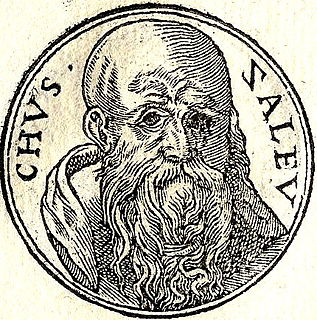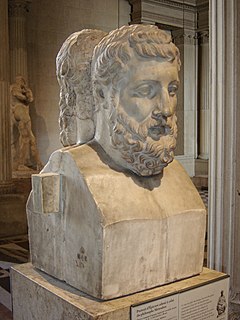
The 1st millennium BC is the period of time between from the year 1000 BC to 1 BC .
It encompasses the Iron Age in the Old World and sees the transition from the Ancient Near East to Classical Antiquity.
Year 395 BC was a year of the pre-Julian Roman calendar. At the time, it was known as the Year of the Tribunate of Cossus, Medullinus, Scipio, Fidenas, Ambustus and Lactucinus. The denomination 395 BC for this year has been used since the early medieval period, when the Anno Domini calendar era became the prevalent method in Europe for naming years.

Ancient Greece was a civilization belonging to a period of Greek history from the Greek Dark Ages of the 12th–9th centuries BC to the end of antiquity. Immediately following this period was the beginning of the Early Middle Ages and the Byzantine era. Roughly three centuries after the Late Bronze Age collapse of Mycenaean Greece, Greek urban poleis began to form in the 8th century BC, ushering in the Archaic period and colonization of the Mediterranean Basin. This was followed by the period of Classical Greece, an era that began with the Greco-Persian Wars, lasting from the 5th to 4th centuries BC. Due to the conquests by Alexander the Great of Macedon, Hellenistic civilization flourished from Central Asia to the western end of the Mediterranean Sea. The Hellenistic period came to an end with the conquests and annexations of the eastern Mediterranean world by the Roman Republic, which established the Roman province of Macedonia in Roman Greece, and later the province of Achaea during the Roman Empire.
Antalcidas, son of Leon, was an ancient Greek soldier, politician, and diplomat from Sparta.
Athenaeus of Naucratis was a Greek rhetorician and grammarian, flourishing about the end of the 2nd and beginning of the 3rd century AD. The Suda says only that he lived in the times of Marcus Aurelius, but the contempt with which he speaks of Commodus, who died in 192, shows that he survived that emperor. He was a contemporary of Adrantus.
The Peace of Nicias, also known as the Fifty-Year Peace, was a peace treaty signed between the Greek city-states of Athens and Sparta in March 421 BC, ending the first half of the Peloponnesian War.

Zaleucus was the Greek lawgiver of Epizephyrian Locri, in Italy, said to have devised the first written Greek law code, the Locrian code, in the 7th century BC, which among other things stipulated that:
A free-born woman may not be accompanied by more than one female slave, unless she is drunk; she may not leave the city during the night, unless she is planning to commit adultery; she may not wear gold jewelry or a garment with a purple border, unless she is a courtesan; and a husband may not wear a gold-studded ring or a cloak of Milesian fashion unless he is bent upon prostitution or adultery.

The Corinthian War was an ancient Greek conflict lasting from 395 BC until 387 BC, pitting Sparta against a coalition of four allied states, Thebes, Athens, Corinth, and Argos, who were initially backed by Persia. The immediate cause of the war was a local conflict in northwest Greece in which both Thebes and Sparta intervened. The deeper cause was hostility towards Sparta provoked by that city's "expansionism in Asia Minor, central and northern Greece and even the west".

Metrodorus of Lampsacus was a Greek philosopher of the Epicurean school. Although one of the four major proponents of Epicureanism, only fragments of his works remain. A Metrodorus bust was found in Velia, slightly different modeled to depict Parmenides.

Lampsacus was an ancient Greek city strategically located on the eastern side of the Hellespont in the northern Troad. An inhabitant of Lampsacus was called a Lampsacene. The name has been transmitted in the nearby modern town of Lapseki.
The Battle of Haliartus was fought in 395 BC between Sparta and Thebes. The Thebans defeated a Spartan force attempting to seize the town of Haliartus, killing the Spartan leader Lysander. The battle marked the start of the Corinthian War, which continued until 387 BC.
Timocrates of Rhodes was a Rhodian Greek sent by the Persian satrap Pharnabazus in 396 or 395 BC to distribute money to Greek city states and foment opposition to Sparta. He visited Athens, Thebes, Corinth, and Argos. His encouragement prompted Thebes to provoke Sparta into war, beginning the Corinthian War, which dragged on from 395 to 387 BC.

Tithraustes was the Persian satrap of Sardis for several years in the early 4th century BC. Due to scanty historical records, little is known of the man or his activities. He was sent out from Susa to replace Tissaphernes in 395 BC, and, after arresting his predecessor, executed him.
Against Meidias is one of the most famous judicial orations of the prominent Athenian statesman and orator Demosthenes.
Timocrates of Lampsacus was a renegade Epicurean who made it his life's mission to spread slander about Epicurus' philosophy and way of life. He was the elder brother of Metrodorus, Epicurus' best friend and most loyal follower, who was born in Lampsacus in the late 4th century BC. He studied with his brother in the school of Epicurus, but some time c. 290 BC, he broke with the school, apparently because he refused to accept that pleasure was the supreme good of life. The dispute became quite bitter; Philodemus quotes Timocrates saying "that he both loved his brother as no one else did and hated him as no one else." In a much quoted letter, Metrodorus, in exaggerated fashion, took Timocrates to task for not making the stomach the standard in everything relating to the prime good. Metrodorus wrote at least one work against Timocrates; and Epicurus also wrote an Opinions on the Passions, against Timocrates. In response, Timocrates wrote a polemic against Epicurus, whereby he claimed that Epicurus was not a genuine Athenian citizen, and that he was slovenly, weak, ignorant, rude, and vomited twice a day from overindulgence. His book against Epicurus, published after his apostasy was entitled "delights" (euphranta).
Epicrates (Epikratês) was a citizen of ancient Athens who took a prominent part in public affairs after the end of the Peloponnesian War.
Amynomachus, son of Philocrates, from the Attic deme of Bate was, together with Timocrates son of Demetrius from Potamos, the heir of Epicurus. Whether they were Epicurean philosophers themselves is uncertain. Epicurus' property was given to them on condition that they give the Garden to Hermarchus and the other Epicureans. In this way Epicurus an Athenian citizen, ensures that Hermarchus and other non-Athenian Epicureans could remain in the Garden, although they cannot inherit legally the property.
Papyrus Oxyrhynchus 233 is a fragment of Demosthenes' speech Against Timocrates, written in Greek. It was discovered in Oxyrhynchus. The manuscript was written on papyrus in the form of a roll. It is dated to the third century. Currently it is housed in the museum of the University of Pennsylvania in Philadelphia.






